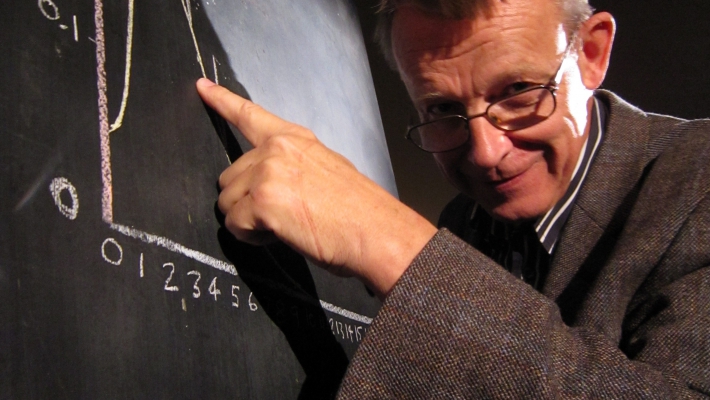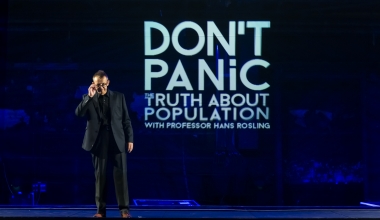
The words 'giant', 'legend', 'hero' and 'genius' are much over-used. But they deservedly apply to Hans. He was an extraordinary life-force. And a lovely man to boot. Over the seven years we worked with him, he inspired us by his example, every bit as much as by his message. His commitment to a fact-based worldview now becomes even more a task for us all. Our condolences to Agneta, Ola, Anna and the family.
Producer/Director Dan Hillman, who worked on all Wingspan’s films with Hans, offers this appreciation of our much missed friend and colleague:
I have so many fond memories from working with Hans. As a presenter he was extraordinary to work with: so committed, so generous with his time, so dedicated to making our work a real partnership, so determined to create the best result we possibly could. He would arrive at Wingspan like a human wave of energy, and the office would crackle with argument and laughter every moment he was there. I loved the technical precision which he applied to finding the best way to tell a story, tell a joke, show a number, and make a point. I deeply appreciated how he would without hesitation introduce us to top-level people all over the world if he thought for one moment that they might help the production in some way.
He was of course always absolutely determined to get things exactly as he wanted them. But he was always collegiate about it, always prepared to debate and argue every point. We had many heated arguments but they were always with a common purpose - to produce the best work. Most of all what I loved about working with him was that he cared about our work as much as I did. He set such high standards. Though his unceasing drive to improve everything we did was sometimes exhausting, I also drew great strength from it. And just as he pushed me to do the very best I could, I always knew he would be happy for me to push him to do better.
I was also often struck by his appreciation for the skills of others. He often spoke about the capable and hard-working professionals he met in countries at every level. When he was still at the Karolinska Institute, I loved seeing his pride at being with those bright students from all over the world. He was very respectful of the many people who worked on our productions. He was very proud of his team at Gapminder. And he was particularly proud of his son Ola and daughter-in-law Anna’s great talents, and of all that they did together with him at Gapminder.
The memories I think I cherish the most are of the hours just spent talking with Hans. Most of the time, of course, it was me listening while he did the talking. Maybe he would be explaining the meaning of an indicator, or the ultimate source of a dataset. Or he would be describing a disease, or its treatment, or what it meant for different people in different places. Or he would be enthusiastically telling one of his many stories: stories of countries he’d visited, world leaders he’d met, patients he’d treated. Or stories of the history of his family and of Sweden. It was often entertaining, always fascinating, always an education. And every story had a point and a purpose - and through all of them shone the immense appreciation and understanding Hans had for the everyday hopes and struggles and living conditions of people everywhere.
When I was busy on one of the productions we did together, these conversations were the highlight of my day. And in between the productions, when I sometimes saw him on his frequent visits to London, each time I saw him I felt I was receiving an infusion of inspiration and energy that would sustain me for long afterwards. The thousands of people he must have met each year probably all felt the same way. The time I spent working with Hans has had a deep impact on me. He reawakened my love of mathematics that had been dormant ever since my school days. More than that, he rekindled what had led me to journalism in the first place: a desire to question and interrogate the beliefs we have about our world, to understand how it is that we can hold onto our beliefs even when they’re demonstrably wrong, and to challenge these ways of thinking with different stories.
Hans was so tough. I guess you need to be tough if you plan to change the mindset of the world. His stamina and energy seemed to me extraordinary. And when he went to Liberia to help in the heroic fight against Ebola I felt so proud to know him.
I don’t know how it was that he was able to see what others couldn’t. His years of experience working in the field gave him great wisdom and authority: he had seen for himself what he was talking about. But at the same time he seemed to see things that plenty of others, who also had these years of practical experience, couldn’t or wouldn’t see.
So much has been said, and will be said, about Hans’ extraordinary skills as a communicator, educator, and entertainer. But for me, what was just as powerful was the fierce and unshakeable moral drive that propelled him. His conviction that even more evil than poverty itself, was any failure of effort to end it, precisely because ending it is so demonstrably possible. And what made his message always so exhilarating to hear, was that he gave us all confidence in our potential, confidence that we could, despite everything, change our world for the better.
I don’t just mourn the loss of Hans’ voice, but also the loss of everything else he might have done. He seemed to have no limits. He had done so much, but he had so much more to give. But most of all I mourn the loss of someone I had come to see not just as a colleague but also as a dear friend. Over the last year, since he told us he had been diagnosed with cancer, I realised I was already missing him terribly. And what I think I missed most of all was his wisdom. He seemed to have an answer to every question.
These last few days I have found myself thinking that Hans had gone just when the world needs him most, at a time when the very concept of facts seems to be called into question. But perhaps things are not in fact worse than ever: if anything, perhaps the world today is more ready than ever to take data, and what it can tell us, seriously. If so, then there’s no doubt that Hans and the Gapminder Foundation has had plenty to do with it. Hans was the first to acknowledge how much his public success rested on the immense amounts of work and creativity of his Gapminder colleagues. That work will go onwards and upwards. It already is.


